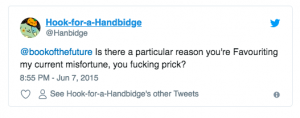Twitter 'Favorites': A Case Study of Evolving Social Media Etiquette
How do you use Twitter’s ‘favorite’ button? Twitter itself suggests a couple of ways that people can use it here: https://support.twitter.com/articles/20169874-favoriting-a-tweet
“Favorites, represented by a small star icon in a Tweet, are most commonly used when users like a Tweet. Favoriting a Tweet can let the original poster know that you liked their Tweet, or you can save the Tweet for later.”
Personally, I use favourites1 largely for the latter reason as part of an attempt to overcome what I still believe is one of the biggest problems on the web: discovery.
I want to know who is talking about issues that are important to me, primarily the four categories we cover: the future human, future cities, future business and future communications. I also want to know about great keynotes (and not just TEDTalks), both as a speaker who is always looking to improve, and as a conference organiser with TMRW, thinking about the next event.
I don’t have time to manually scour Twitter for people talking about these things so I use an automated tool that finds and favourites tweets containing certain key phrases2. This creates a shortlist (or sometimes a long list) of tweets for me (and Mason, my colleague who co-curates the feed) to check out.
The phrases we search for are constantly being tweaked but as you can see from looking at the current favourites list, it has a pretty good hit rate of interesting stuff. From it I find new people to follow, interesting articles and things that we might retweet.
We also find abuse. Like this (excuse the language).

Now this person clearly uses favourites in the other way that Twitter suggests. They’re having a very difficult time. I can absolutely see how favouriting a tweet where they were documenting their problems could be seen as offensive — if you assume that by favouriting the tweet I was ‘liking’ their misfortune.
For me and others (I know I’m not alone in this), the favourite has two meanings. It’s not as simple as a Facebook ‘Like’. But we may well be in the minority. To the extent that in the future our usage of the favourite is not only not recognised, it is broadly accepted as wrong. Maybe that’s the case already?
Either way this is an interesting little case study of how the meaning of simple gestures in social media can evolve rapidly, be interpreted differently by different people, and how that difference in interpretation can clearly cause offence.
1. Dropping the quotes and adding a 'u' from this point on.
2. By the way I'm not trying to hide the fact that the tool that I use to do this is promoted as a marketing tool, that that is how we discovered it, or that it works very well at finding us new followers as well as people to follow. But research is absolutely a key part of its value.
